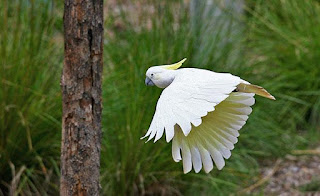It is heartening to know that they are loving and affectionate. But, like any owner-to-be, you may wonder whether it is really true that these charming creatures can be destructive at times. If yes, in what way. Let's check that out together.
There is such an abundance of information regarding avian behavior. This probably leads to more confusion than clarity when we try to seek help from it. So, our approach to this
subject is a little different.
Now, ask yourself a question. What are some of the more common bird behavior that worries you and sometimes even annoys you?
Well, it can be as silly as undisciplined potty behavior or something more serious like feather plucking, screaming and biting (sometimes that may even get on your nerves).
A traditional approach to any of these problems is to look for a cause. Even the veterinary fraternity looks for and attributes the problem to a 'single cause'. Most times the cause and the problem will seem to have no apparent relation. Often, most problems have more than just one cause. And many times, the cause of the problem is not even the bird. Frequently the problem is 'us'. Yes, shocking though it may be!
What is a good cockatoo (by your definition)? Don't look at the cockatoo for an answer; it's the one with the least knowledge of your expectations.
Perhaps, you can answer this. What is it to be a good child? A child knows. It may not be able to express itself in crystal clear terms. But it knows. How? Because of the child's constant contact with other humans in its natural environment, it observes and learns to differentiate good behavior from bad. And what it can't learn from observation is taught.
But, what about the cockatoo? It has no such opportunity to learn from its flock. In captivity, you and your family are its flock. Cockatoos are extremely intelligent creatures.
They observe and would learn a lot more than you are willing to grant it.
To be able to address just this one issue "why do they resort to feather plucking?", lets consider the basics. What is a cockatoo? Once you know the answer, you will see for
yourself that it's not a dumb question. A cockatoo is more than what you've taken for granted.
A cockatoo is a gregarious creature. And certain aspects of its psyche are hard wired. The need to keep with the flock. The need to constantly communicate with its mate or members of its flock. The need to feed together. The need for companionship and affection. And the need to feel secure.
These are just some of its needs. Often these are needs that a captive bird may not be able to fulfill themselves. So, it looks up to its human family to provide these basic needs.
If any of these is not fulfilled that's when the bird resorts to feather plucking, among other things.
So, it's necessary to anticipate the basic needs of the bird and to see that they are met.
Cockatoos resort to feather plucking for a number of reasons. The problem could be that the bird is not happy with its environment, us, or our environment. But often the cause is put down to one of these:
1) Insecurity
2) Hormonal fluctuations
3) Stress/ anxiety
4) Disease
5) Internal/ external parasites
6) Insufficient/ incorrect nutrition
The cockatoo's feather plucking can be because of any or all of these reasons, or none of them and something totally extraneous.
Now that we have identified the cause (or causes), let's now see what your role is.
Cockatoo is a social creature. So, let's give it the assurance that it's not in solitary confinement. At every opportunity, let the bird know that it is a part of a flock and make it feel at home.
Call to it as often as possible. Pet it. Take it in your arms and set it down whenever you get the chance.
Give its feed whenever the family sits down for a meal.
Don't get into arguments in your bird's presence. It is important for the bird to know that it's part of a happy flock. Cockatoos are so intelligent that they know when all is not well. This knowledge leads to stress and anxiety.
Do whatever is necessary to keep the bird in good health. Make sure it's free of internal and external parasites. Provide it with the best nutrition.
Apart from these, causes like hormonal fluctuations should be treated with advice from the vet.
This in turn, will do all that it can to strengthen your relationship with your pet.
The above is an excerpt from the free newsletter on "All About Cockatoos" published by Geostar Publishing & Services LLC.
Article Source: http://EzineArticles.com/638857
